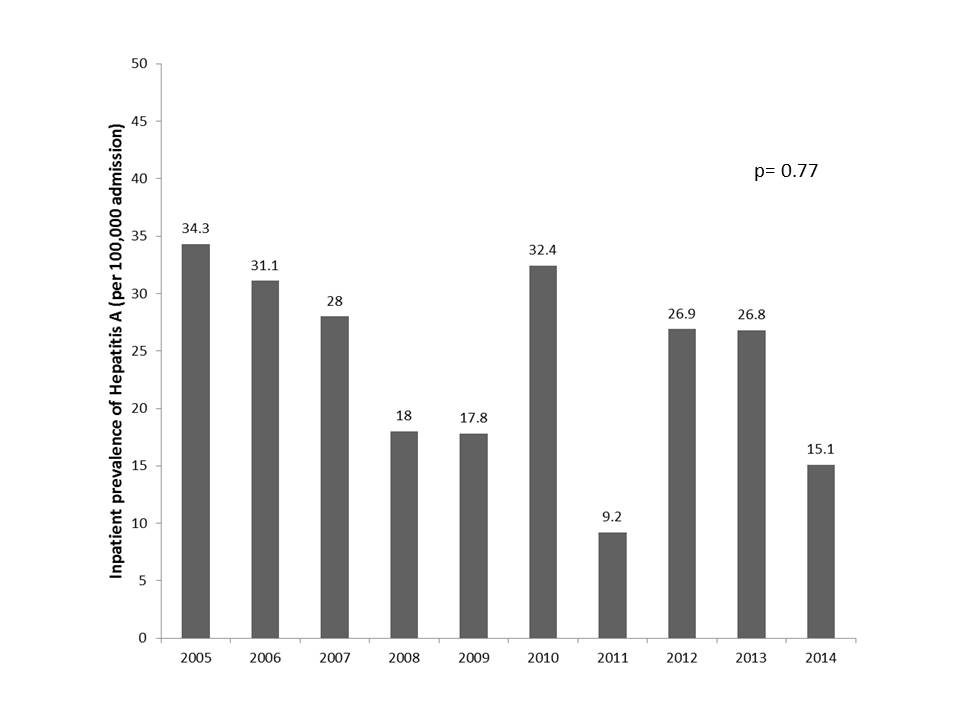Hepatitis A Hospitalizations among Kidney Transplant Recipients in the United States: A Nationwide Study
W. Cheungpasitporn1, C. Thongprayoon2, P. Ungprasert3, K. Wijarnpreecha4, P. T. Kroner4
1Nephrology, University of Mississippi Medical Center, Jackson, MS, 2Nephrology and Hypertension, Mayo Clinic, Rochester, MN, 3Nephrology, University of Mississippi Medical Center, Bangkok, Thailand, 4Gastroenterology and Hepatology, Mayo Clinic, Jacksonville, FL
Meeting: 2019 American Transplant Congress
Abstract number: D238
Keywords: Hepatitis, Kidney, Kidney transplantation, Resource utilization
Session Information
Session Name: Poster Session D: Non-Organ Specific: Viral Hepatitis
Session Type: Poster Session
Date: Tuesday, June 4, 2019
Session Time: 6:00pm-7:00pm
 Presentation Time: 6:00pm-7:00pm
Presentation Time: 6:00pm-7:00pm
Location: Hall C & D
*Purpose: Hepatitis A illness severity increases in immunosuppressed patients and one of important indicators of hepatitis A illness severity is whether patients require hospitalization. This study aimed to evaluate the hospitalization rate for hepatitis A among kidney transplant recipients and its outcomes as well as resource utilization, when compared to kidney transplant recipients without hepatitis A.
*Methods: The 2005-2014 National Inpatient Sample database was used to identify all hospitalized kidney transplant recipients with an associated diagnosis of hepatitis A. The hospital mortality, the presence of multi-organ failure, ICU stay, need for abdominal ultrasound, hospital length of stay, total hospitalization costs or charges, and associated liver conditions were compared between patients with and without hepatitis A, adjusting for potential confounders.
*Results: Of 871,024 kidney transplant recipients identified, 202 had hepatitis A. The overall inpatient prevalence of hepatitis A in kidney transplant recipients over 10 years in the United States was 23.42 cases per 100,000 admissions. There were no statistically significant changes in the inpatient prevalence of hepatitis A in kidney transplant recipients during the study period (p= 0.77), ranging from 9.2 to 34.3 per 100,000 admissions (Figure). Among hospitalized kidney transplant recipients with hepatitis A, 27.9% were from Northeast, 29.2% were from Midwest, 23.8% were from South, and 19.1% were from West, respectively. Hepatitis A was not significantly associated with increased hospital mortality, multi-organ failure, need for abdominal ultrasound, hospital length of stay, total hospitalization costs and charges, when compared to those without hepatitis A. However, it is significantly associated with increased ICU stay, co-existing hepatitis B and C infection, and liver failure.
*Conclusions: Overall, inpatient prevalence of hepatitis A in kidney transplant recipients in the United States (years 2005-2014) was 23.42 cases per 100,000 admissions. Hospitalization for Hepatitis A after kidney transplantation is associated with increased ICU stay, co-existing hepatitis B and C infection, and liver failure.
To cite this abstract in AMA style:
Cheungpasitporn W, Thongprayoon C, Ungprasert P, Wijarnpreecha K, Kroner PT. Hepatitis A Hospitalizations among Kidney Transplant Recipients in the United States: A Nationwide Study [abstract]. Am J Transplant. 2019; 19 (suppl 3). https://atcmeetingabstracts.com/abstract/hepatitis-a-hospitalizations-among-kidney-transplant-recipients-in-the-united-states-a-nationwide-study/. Accessed January 16, 2026.« Back to 2019 American Transplant Congress

